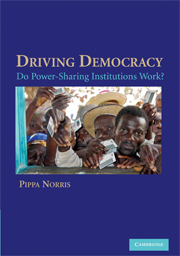Book contents
- Frontmatter
- Contents
- List of Tables
- List of Figures
- Preface and Acknowledgments
- PART I DO POWER-SHARING REGIMES WORK?
- PART II THE IMPACT OF POWER-SHARING INSTITUTIONS
- 5 Electoral Systems
- 6 Presidential and Parliamentary Executives
- 7 Federalism and Decentralization
- 8 The Fourth Estate
- PART III CONCLUSIONS
- Technical Appendix: Description of the Variables and Data Sources
- Notes
- Select Bibliography
- Index
7 - Federalism and Decentralization
Published online by Cambridge University Press: 05 September 2012
- Frontmatter
- Contents
- List of Tables
- List of Figures
- Preface and Acknowledgments
- PART I DO POWER-SHARING REGIMES WORK?
- PART II THE IMPACT OF POWER-SHARING INSTITUTIONS
- 5 Electoral Systems
- 6 Presidential and Parliamentary Executives
- 7 Federalism and Decentralization
- 8 The Fourth Estate
- PART III CONCLUSIONS
- Technical Appendix: Description of the Variables and Data Sources
- Notes
- Select Bibliography
- Index
Summary
Parliamentary republics and proportional electoral systems generate horizontal checks and balances in the core institutions of state. By contrast, federalism and decentralization lead toward vertical power-sharing among multiple layers of government. Contemporary debates about decentralized governance have arisen in many plural democracies, notably among the Francophone majority living in Quebec, the Basques in Spain, and the Scots in the United Kingdom. These arguments have been particularly influential in fragile multinational states afflicted with deep-rooted civil wars where decentralization has been advocated as a potential constitutional solution aiming to reduce conflict, build peace, and protect the interests of marginalized communities. In Sri Lanka, for example, federalism has been proposed in a peace-agreement designed to settle the long-running tensions between the majority Buddhist Sinhalese community and the mainly Hindu Tamils in the northeast. In Sudan the 2005 peace-settlement proposed a high degree of federal autonomy for the south and a constitutionally guaranteed regional division of oil revenues, in the attempt to bind together a country afflicted for two decades by a bloody civil war between the mainly Muslim north and the animist and Christian south. Federal arrangements have also been advocated, more controversially, in Iraq as a mechanism seeking to stem violence among Shi'a and Sunni Muslims, as well as to provide some degree of autonomy for the Kurds in the north.
- Type
- Chapter
- Information
- Driving DemocracyDo Power-Sharing Institutions Work?, pp. 157 - 185Publisher: Cambridge University PressPrint publication year: 2008
- 1
- Cited by

